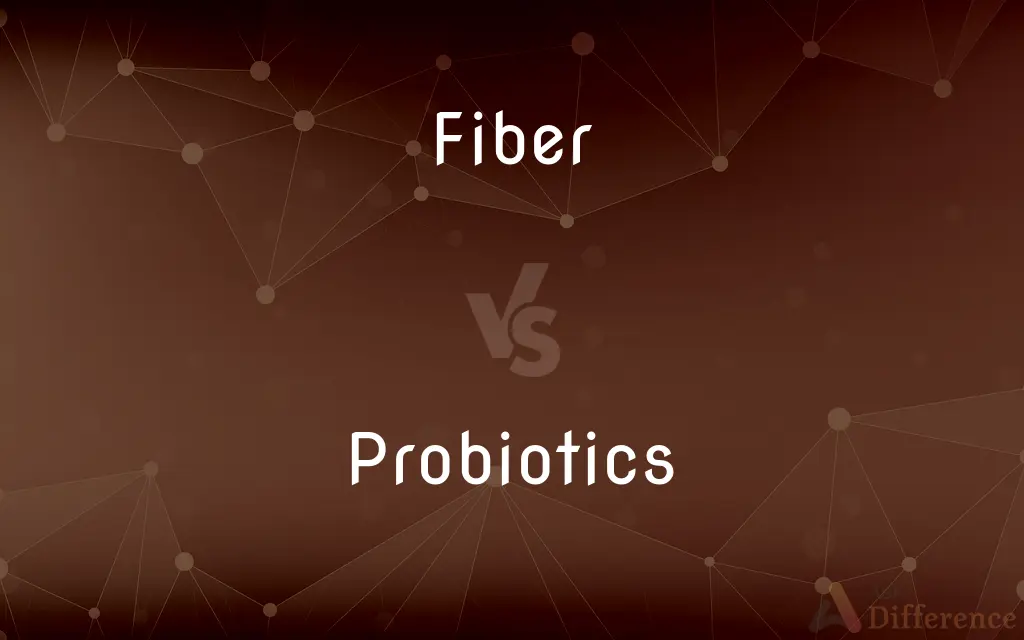Fiber vs. Probiotics — What's the Difference?
By Tayyaba Rehman — Published on November 11, 2023
Fiber, indigestible plant material, aids digestion and prevents constipation. Probiotics are beneficial bacteria promoting gut health, potentially boosting immunity, and improving digestion.

Difference Between Fiber and Probiotics
Table of Contents
ADVERTISEMENT
Key Differences
Fiber and Probiotics are essential components in nutrition that play distinct roles in digestive health. Fiber, primarily found in plants, is a complex carbohydrate that the body can't digest. Its primary role is to promote healthy bowel movements and support a healthy digestive tract. On the other hand, Probiotics are live microorganisms that, when ingested, offer health benefits, especially to the digestive system.
Fiber can be categorized into soluble and insoluble types, each with its unique benefits. Soluble fiber dissolves in water, forming a gel-like substance that can help lower cholesterol and stabilize blood sugar levels. Insoluble fiber adds bulk to stools, aiding in bowel regularity. Probiotics, however, consist of various strains of beneficial bacteria that colonize the gut, helping maintain a balanced gut flora.
Consuming Fiber is essential for several reasons, including weight management, reducing the risk of chronic diseases, and supporting a healthy gut microbiome. It acts as food for beneficial bacteria, facilitating their growth. Probiotics, in contrast, directly introduce these beneficial bacteria into the gut, ensuring a healthier balance of gut microbes.
While Fiber is found in foods like whole grains, fruits, and vegetables, Probiotics are present in fermented foods such as yogurt, sauerkraut, and kimchi. Many people integrate both fiber-rich foods and probiotic-rich foods into their diets for optimal digestive health.
It's worth noting that Fiber and Probiotics often work synergistically. Fiber serves as a prebiotic, feeding the beneficial bacteria (like those introduced by Probiotics) in the gut, promoting their growth and activity.
ADVERTISEMENT
Comparison Chart
Definition
Non-digestible carbohydrate found in plants.
Live beneficial microorganisms ingested for health benefits.
Primary Benefit
Aids in digestion and promotes bowel regularity.
Balances gut flora and supports digestive health.
Sources
Whole grains, fruits, vegetables.
Fermented foods like yogurt, sauerkraut, kimchi.
Types/Components
Soluble and insoluble fiber.
Various strains of bacteria like Lactobacillus and Bifidobacterium.
Interaction with Gut
Serves as food for beneficial bacteria.
Colonizes the gut, maintaining or restoring balanced microbiome.
Compare with Definitions
Fiber
Promotes bowel regularity and digestive health.
Eating whole grains ensures adequate Fiber intake for healthy bowel movements.
Probiotics
Live microorganisms offering health benefits when consumed.
Probiotics in yogurt support a healthy gut.
Fiber
Non-digestible plant-based carbohydrate.
Vegetables are a good source of Fiber that aids digestion.
Probiotics
Aid in maintaining a balanced gut flora.
After antibiotics, Probiotics can help restore gut balance.
Fiber
Can be classified as soluble or insoluble.
Oats contain soluble Fiber that helps lower cholesterol.
Probiotics
Found predominantly in fermented foods.
Kefir is a drink rich in Probiotics.
Fiber
Feeds the beneficial bacteria in the gut.
Consuming Fiber supports the growth of good gut bacteria.
Probiotics
Consists of various bacterial strains.
Different Probiotics have specific strains beneficial for distinct health aspects.
Fiber
A slender, elongated, threadlike object or structure.
Probiotics
Beneficial for digestion and immunity.
Consuming Probiotics can improve digestive health.
Fiber
(Botany) One of the elongated, thick-walled cells that give strength and support to plant tissue.
Probiotics
Plural of probiotic
Fiber
Any of the filaments constituting the extracellular matrix of connective tissue.
Fiber
Any of various elongated cells or threadlike structures, especially a muscle fiber or a nerve fiber.
Fiber
A natural or synthetic filament, as of cotton or nylon, capable of being spun into yarn.
Fiber
Material made of such filaments.
Fiber
An essential element of a person's character
"stirred the deeper fibers of my nature" (Oscar Wilde).
Fiber
Strength of character; fortitude
Lacking in moral fiber.
Fiber
Coarse, indigestible plant matter, consisting primarily of polysaccharides such as cellulose, that when eaten stimulates intestinal peristalsis. Also called bulk, roughage.
Fiber
(countable) A single elongated piece of a given material, roughly round in cross-section, often twisted with other fibers to form thread.
The microscope showed a single blue fiber stuck to the sole of the shoe.
Fiber
(uncountable) A material in the form of fibers.
The cloth is made from strange, somewhat rough fiber.
Fiber
(textiles) A material whose length is at least 1000 times its width.
Please use polyester fiber for this shirt.
Fiber
Dietary fiber.
Fresh vegetables are a good source of fiber.
Fiber
(figuratively) Moral strength and resolve.
The ordeal was a test of everyone's fiber.
Fiber
(mathematics) The preimage of a given point in the range of a map.
Under this map, any two values in the fiber of a given point on the circle differ by 2π.
Fiber
(category theory) The pullback of a morphism along a global element (called the fiber of the morphism over the global element).
Fiber
(computing) A kind of lightweight thread of execution.
Fiber
(cytology) A long tubular cell found in bodily tissue.
Fiber
One of the delicate, threadlike portions of which the tissues of plants and animals are in part constituted; as, the fiber of flax or of muscle.
Fiber
Any fine, slender thread, or threadlike substance; as, a fiber of spun glass; especially, one of the slender rootlets of a plant.
Fiber
The inherent complex of attributes that determine a person's moral and ethical actions and reactions; sinew; strength; toughness; as, a man of real fiber.
Yet had no fibers in him, nor no force.
Fiber
A general name for the raw material, such as cotton, flax, hemp, etc., used in textile manufactures.
Fiber
That portion of food composed of carbohydrates which are completely or partly indigestible, such as cellulose or pectin; it may be in an insoluble or a soluble form. It provides bulk to the solid waste and stimulates peristalsis in the intestine. It is found especially in grains, fruits, and vegetables. There is some medical evidence which indicates that diets high in fiber reduce the risk of colon cancer and reduce cholesterol levels in the blood. It is also called dietary fiber, roughage, or bulk.
Fiber
A leatherlike material made by compressing layers of paper or cloth.
Fiber
A slender and greatly elongated solid substance
Fiber
The inherent complex of attributes that determine a persons moral and ethical actions and reactions;
Education has for its object the formation of character
Fiber
A leatherlike material made by compressing layers of paper or cloth
Fiber
Essential for weight management and disease prevention.
Increasing Fiber intake can help maintain a healthy weight.
Common Curiosities
Are Probiotics naturally occurring in the body?
Yes, Probiotics are beneficial bacteria naturally present in the gut but can be supplemented through diet.
Can Probiotics help after antibiotic use?
Yes, Probiotics can help restore gut balance after antibiotics disrupt the natural microbiome.
How does soluble Fiber differ from insoluble Fiber?
Soluble Fiber dissolves in water and can lower cholesterol, while insoluble Fiber adds bulk to stools.
Can Fiber aid in weight loss?
Yes, Fiber can promote feelings of fullness, aiding in weight management.
What is fiber?
A non-digestible carbohydrate that aids digestion and provides bulk to stools.
Which foods are high in Fiber?
Foods like whole grains, fruits, and vegetables are rich in Fiber.
Is Fiber beneficial for heart health?
Yes, certain types of Fiber can help reduce cholesterol levels, benefiting heart health.
Do all fermented foods contain Probiotics?
Most fermented foods contain Probiotics, but levels can vary based on processing and storage.
What foods are high in fiber?
Fruits, vegetables, whole grains, and legumes are typically high in fiber.
What's the primary role of Fiber in the diet?
Fiber aids in digestion, promotes bowel regularity, and feeds beneficial gut bacteria.
Can probiotics improve mental health?
Some research suggests a link between gut health (influenced by probiotics) and mental well-being, known as the "gut-brain axis."
Are there side effects to consuming too many Probiotics?
Overconsumption of Probiotics can lead to bloating or upset stomach in some people.
Where can I find probiotics in foods?
In fermented foods like yogurt, kefir, and sauerkraut, or as dietary supplements.
Can fiber aid weight loss?
Yes, fiber can promote feelings of fullness, potentially aiding in weight management.
What are probiotics?
Beneficial live bacteria that promote gut health and can enhance immune function.
How does fiber affect digestion?
It adds bulk to stools and helps prevent constipation by promoting regular bowel movements.
Share Your Discovery

Previous Comparison
Series Resonance vs. Parallel Resonance
Next Comparison
Air Purifier vs. DehumidifierAuthor Spotlight
Written by
Tayyaba RehmanTayyaba Rehman is a distinguished writer, currently serving as a primary contributor to askdifference.com. As a researcher in semantics and etymology, Tayyaba's passion for the complexity of languages and their distinctions has found a perfect home on the platform. Tayyaba delves into the intricacies of language, distinguishing between commonly confused words and phrases, thereby providing clarity for readers worldwide.











































